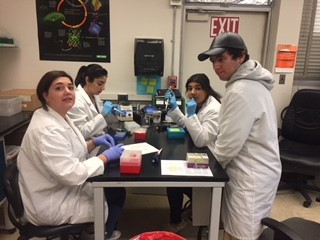Undergraduate students enrolled in undergraduate research at Cal Poly Pomona are getting some applied lab experience processing water samples collected from Ontario’s constructed wetlands. Under the supervision of Dr. Shelton Murinda, Professor in the Animal and Veterinary Sciences Department, students conduct fecal indicator bacterial counts using the IDEXX system. Dr. Shelton Murinda adds “the students are isolating E. coli and Enterococcus species on conventional agar media, and performing microscopy and other diagnostic tests. Additionally the students are isolating DNA from the bacterial cultures and conducting Polymerase Chain Reaction (PCR) to confirm if the bacterial strains isolated from the water samples are target fecal indicator species, that is, E. coli or Enterococcus. They are also conducting PCR to confirm if the E. coli are Shiga-toxin producing E. coli (such as E. coli O157:H7) and if the Enterococcus are Enterococcus faecium or Enterococcus faecalis.” Shiga toxin producing E. coli will be confirmed using Recombinase Polymerase Amplification, a protocol developed by Drs. Murinda, Ibekwe and co-workers in 2014.
Shiga-toxin producing E. coli are known to cause outbreaks each year and are a particular concern to public officials, the City of Ontario included. Enterococcus faecium and Enterococcus faecalis are also pathogenic when found outside the gastrointestinal tract of humans and animals. Sample collection from the constructed wetlands is being facilitated by the City of Ontario team.
Photo Caption: Cal Poly Pomona students conduct PCR on DNA isolated from E. coli and Enterococcus to confirm the identity of the organisms obtained from Ontario, CA’s constructed wetlands. Photo courtesy of Shelton Murinda.

